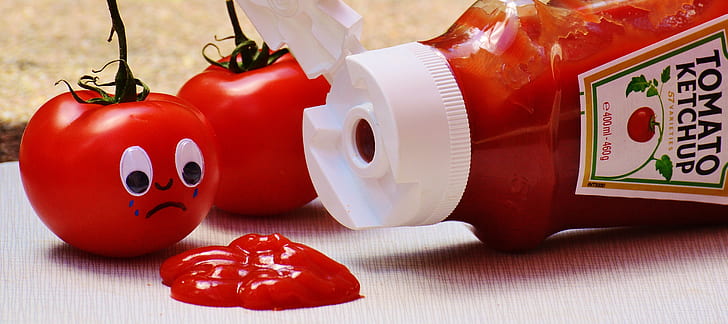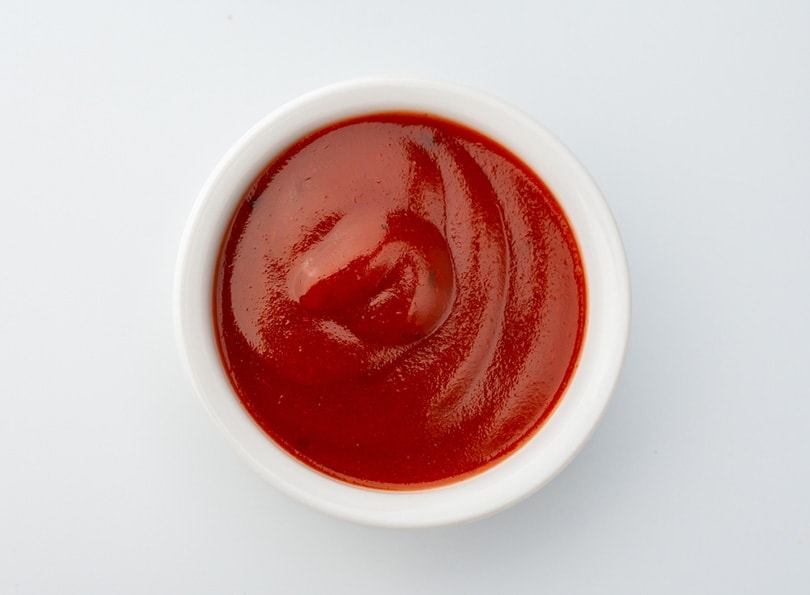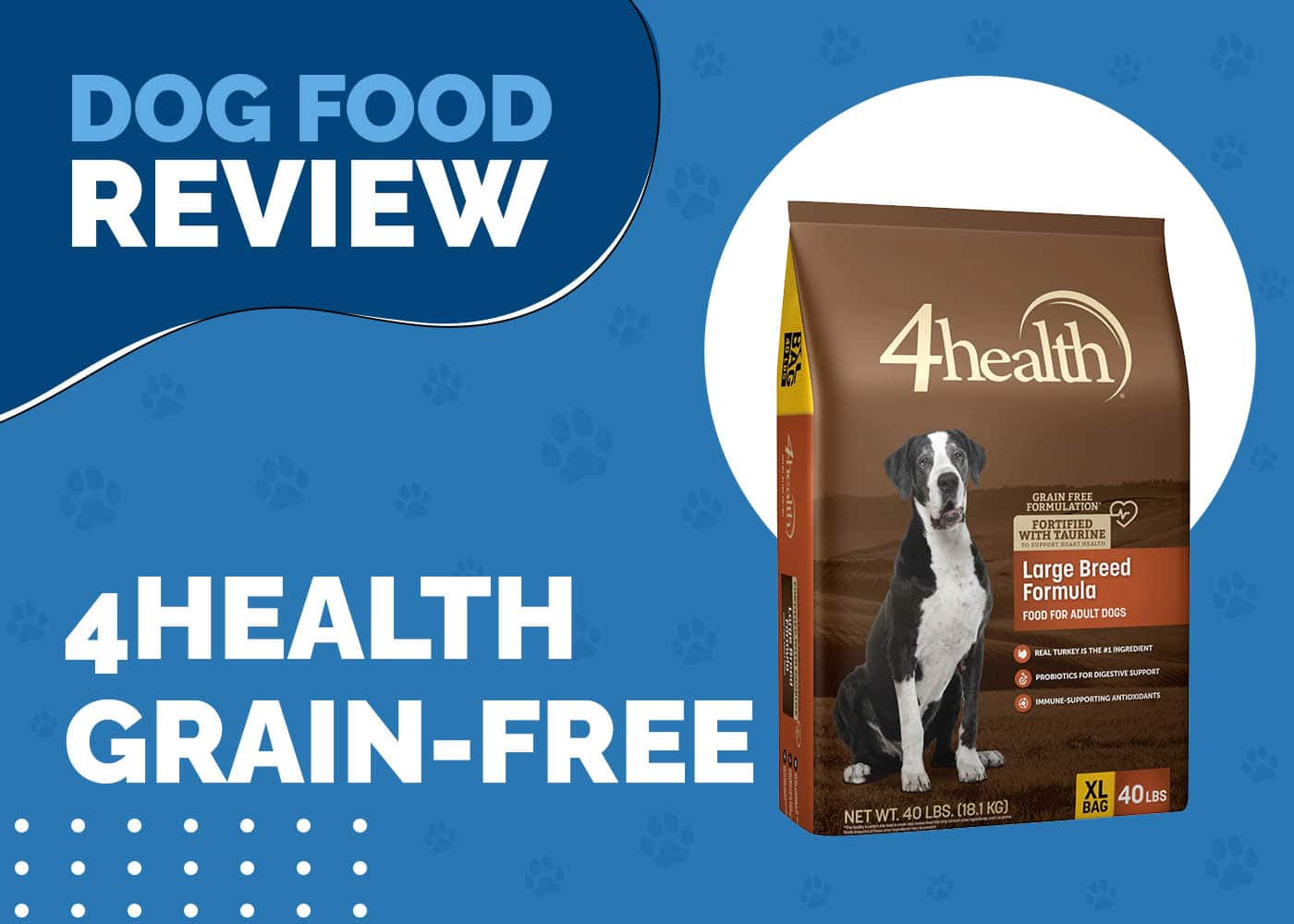Can Dogs Eat Ketchup? Health & Safety Facts

Updated on

You almost certainly aren’t reading this because you gave your dog ketchup on purpose. Ketchup is not a dog food, and we’ve met very few owners who think it is. However, if your dog jumped onto the table during a family barbecue and grabbed a fully loaded cheeseburger, you almost certainly have nothing to worry about—not from the ketchup, at least.
In this article, we’ll go over whether dogs can eat ketchup, whether they should eat ketchup, and if any types of ketchup can be seriously harmful to your best friend.
What Do We Mean by Ketchup?
Ketchup isn’t just mashed tomatoes. A bottle of Heinz’s “simple ingredients” ketchup contains tomato concentrate, vinegar, salt, sugar, and onion powder, plus “spice” and “natural flavoring” that could be anything.1 Other kinds of ketchup include sugar-free sweeteners like xylitol or thickening agents like xanthan gum.

Toxic ketchup ingredients
Of all the ingredients we just mentioned, can any really hurt your dog? Let’s find out.
- Onions and onion powder are probably fine. While dogs should not eat raw onions, there isn’t enough onion in ketchup to threaten their health.
- The same goes for garlic and garlic powder. While both of these vegetables can be bad for your dog’s red blood cells, they would have to eat whole bottles of ketchup at a time to start feeling the effects.
- Sodium content from the added salt can leave your dog dehydrated, though this too isn’t a serious concern if they’ve only eaten a couple of bites.
- Tomatoes do contain some chemicals that can poison dogs, including tomatine and solanine. However, those compounds are only present while the tomato is growing and ripening. Fully ripe, red tomatoes aren’t toxic for dogs—just don’t let them chew on green tomatoes or the stems and leaves of tomato plants.
- Xylitol is a much bigger threat. Ketchup containing xylitol should be kept away from dogs at all times. The sugar substitute is toxic to dogs in the amount of 50 milligrams per pound of the dog’s body weight. An average tablespoon of sugar-free ketchup contains 2 grams (2,000 milligrams) of xylitol, enough to sicken a 40-pound pooch. The math proves it: no amount of xylitol ketchup is safe.
- One other ingredient you probably don’t have to worry about is xanthan gum. There are a lot of horror stories about xanthan gum online, but in a controlled study, xanthan gum had no adverse health effects on either dogs or rats.
- Finally, make sure to do your research to find out what generic terms like natural flavors mean. Different manufacturers use them to represent different ingredients.
How Your Dog Might Get Access to Ketchup
You’re diligent about keeping human foods away from your dog, but there are a few situations where you should be especially on your guard.
- Barbecues: At a cookout, lots of people are in your yard having a good time. Your dog is likely jazzed by all the new friends and excited by all the new smells, and you’re busy with a dozen other things. If you pre-ketchup your burgers or hot dogs, your dog could easily snag one when you aren’t looking.
- Tip: Ask your guests not to put ketchup on anything unless they’re about to eat it.
- Fast food runs: Fast food restaurants give you a lot of ketchup packets, and it’s easy to lose track of one or two.
- Tip: Make sure to either use or dispose of all the ketchup packets from your food bag.
- Unwashed dishes: Leaving traces of ketchup on your plates in the sink can attract your dog, who’s always curious about new tastes.
- Tip: Even if you can’t do all the dishes right away, carefully rinse all the ketchup down the drain before leaving them in the sink.

Help! My Dog Ate Ketchup!
Don’t panic! While keeping an eye on your pup, work through the following steps.
- Find out if the ketchup contained xylitol. It should be on the label. If it did, take your dog to the vet immediately. Even small amounts of xylitol can make your dog’s bloodstream flood with insulin, causing nausea, vomiting, and muscle weakness.
- Estimate how much ketchup your dog ate. If it was just a small amount, you can relax. If it was more than a tablespoon, go to step 3.
- Monitor your dog. If there wasn’t xylitol involved, the worst thing your dog will get from ketchup is an upset stomach. Just make sure you’re there to help them through the discomfort.
- Train them to avoid ketchup from now on. If they decide they like the ketchup, you’ll probably have to deal with them being a bit more aggressive at dinnertime. Make sure to be a firm pack leader and never give in to those pleading puppy eyes.

Ketchup alternatives for dogs
If you want to introduce a bit of variety into your dog’s diet, you can feed them handmade tomato sauce instead. Keep it simple: just heat up plain tomato sauce or a can of diced or crushed tomatoes, and add dog-safe spices like basil, parsley, and oregano. If you cook up some doggie tomato sauce, share the recipe with us in the comments!
Featured Image Credit: Piqsels










